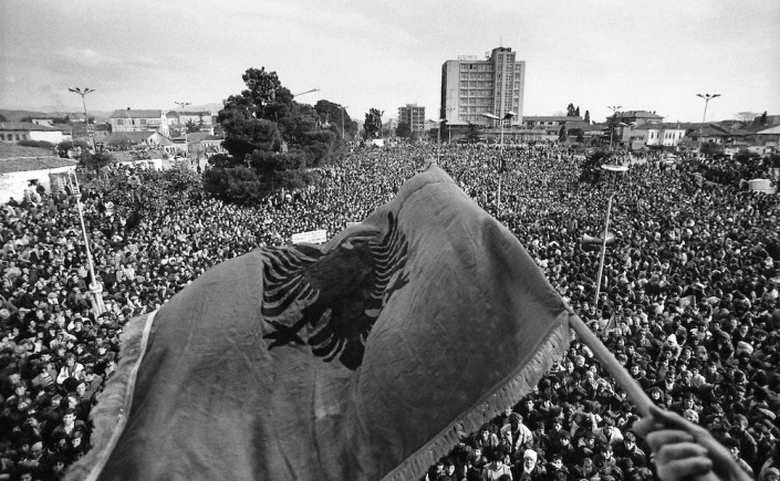The period of communism in Albania, which lasted from 1945 to 1991, was marked by a highly centralized government, strict state control over the economy and society, and a cult of personality centered around the country’s longtime leader, Enver Hoxha. While the communist government brought some improvements in education, healthcare, and women’s rights, it also caused widespread poverty, repression, and isolation for Albanians.
The Rise of Communism in Albania
Albania was one of the poorest and most isolated countries in Europe at the end of World War II. The country had been occupied by Italy and then Germany during the war, and its economy and infrastructure were in shambles. The communist party, which had been formed in 1941, gained popularity among Albanians for its promises to address poverty and inequality.
In November 1944, the communist-led National Liberation Army, with Soviet support, took control of the country and declared Albania a people’s republic. Enver Hoxha, who had been a leader of the communist party since its formation, became the country’s prime minister and later its dictator.
Hoxha’s Vision for Albania
Hoxha’s vision for Albania was heavily influenced by Soviet leader Joseph Stalin’s idea of socialism in one country. Hoxha believed that Albania could only achieve true communism if it was completely self-reliant and isolated from the capitalist world. He saw the Soviet Union as an ally but also as a potential threat to Albanian independence.
Hoxha’s policies aimed to create a highly centralized state in which the government had complete control over the economy and society. He nationalized industries and collectivized agriculture, effectively eliminating private property. The government also controlled the media, education, and all aspects of public life. Any opposition to the government was brutally suppressed, and thousands of Albanians were executed or sent to forced labor camps.
The cult of personality around Hoxha was also a central feature of Albanian communism. His image was ubiquitous, and his ideas were taught in schools and promoted in the media. Any criticism of Hoxha was considered a threat to the state and was dealt with harshly.
The Legacy of Albanian Communism
The legacy of Albanian communism is complex and controversial. On the one hand, the communist government made some significant improvements in education, healthcare, and women’s rights. Before communism, Albania was one of the most backward countries in Europe, with high illiteracy rates and poor healthcare. The communist government invested in education and healthcare, building schools and hospitals and providing free services to all Albanians.
The communist government also promoted gender equality, making Albania one of the few countries in the world where women had equal rights under the law. Women were encouraged to participate in the workforce and were given equal pay for equal work. The government also provided free childcare and maternity leave, making it easier for women to balance work and family life.
However, the communist government also caused widespread poverty, repression, and isolation for Albanians. The government’s policies of collectivization and nationalization led to a decline in agricultural productivity and food shortages. The government also restricted travel and communication, making it difficult for Albanians to interact with the outside world.
The government’s brutal repression of dissent was also a dark legacy of Albanian communism. Thousands of Albanians were executed or sent to forced labor camps for opposing the government or even for being suspected of opposing the government. The government also targeted religious groups, banning all religious practice and destroying mosques and churches.
Aftermath of Albanian Communism
Albania’s communist government collapsed in 1991, following a series of protests and demonstrations that were part of the larger wave of democratic revolutions that swept across Eastern Europe. Since then, Albania has transitioned to a multi-party democracy but the legacy of communism has continued to shape the country’s politics and society. The transition to democracy was not easy, as Albania faced widespread poverty, corruption, and political instability in the years following the collapse of communism.
In the post-communist era, Albania has faced significant economic challenges, including high unemployment, a large informal economy, and a lack of foreign investment. The country has also struggled with corruption and organized crime, which have undermined its democratic institutions and hindered its progress towards European Union membership.
Despite these challenges, Albania has made progress in recent years, particularly in terms of economic growth and social development. The country has implemented a series of economic reforms aimed at attracting foreign investment and creating a more business-friendly environment. Albania has also made strides in improving its infrastructure and expanding access to education and healthcare.
However, the legacy of communism continues to influence Albanian society, particularly in terms of political culture and attitudes towards the state. Many Albanians remain skeptical of the government and political institutions, given the country’s history of authoritarianism and repression. There is also a significant divide between urban and rural areas, with rural communities often left behind in the country’s economic and social development.
In conclusion, the period of communism in Albania was marked by a highly centralized government, strict state control over the economy and society, and a cult of personality centered around Enver Hoxha. While the communist government brought some improvements in education, healthcare, and women’s rights, it also caused widespread poverty, repression, and isolation for Albanians. The legacy of communism continues to shape Albanian society and politics, and the country faces significant challenges as it works towards greater economic and social development.
